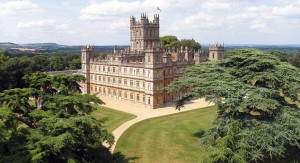It was Spring Break last week at Duke, so I enjoyed all that “free” time to do two things. During the day, I worked on revising a few research papers that are in various stages of production. At night, I watched all of the BBC’s ITV’s Downton Abbey.

I thoroughly enjoyed the show, but I wonder why I — and, apparently, hundreds of thousands of others — enjoyed it so much. When all is said and done, most of the characters are pretty one-dimensional, and The Wire this is not. But if you’ve not seen the show and plan on watching it, skip the next two paragraphs to avoid the spoilers.
Thomas and O’Brien, who are respectively a footman and the lady’s maid, are always bad. Anna and Bates, who are respectively the head housemaid and the lord’s valet, are always good. Perhaps the only character who exhibits a bit of depth is the dowager countess, brilliantly played by Maggie Smith.
(Yes, I know: Bates is in prison for the death of his wife. But is there any doubt that season 3 will bring a new development which will exonerate him?)
So what explains Downton Abbey‘s popularity? Over lunch on Friday, a friend said he thought the show was popular because it allows us to picture ourselves living “that type of life,” by which he meant the life led by the aristocratic Crawley family. But I’m not sure this fully explains it.
As a social scientist, I enjoyed Downton Abbey because it relates cultural and social change (i.e., the erosion of the class structure in Britain) to historical (i.e., World War I, the Spanish influenza epidemic) and technological (i.e., electrification, the arrival of the telephone) change. But again, I’m not sure this fully explains the show’s popularity. So what else could it be? I’d be curious to hear about readers’ views in the comments section.
Speaking of World War I, as soon as I finish the book I am currently reading, I am looking forward to reading Paul Fussell’s The Great War and Modern Memory, which explores the many ways in which World War I brought in the modern era.
(By the way, this explains why I paid no attention to the whole Kony 2012/Invisible Children controversy. Click here if you want a list of reading materials about Kony 2012.)
Why Is “Downton Abbey” So Popular?
It was Spring Break last week at Duke, so I enjoyed all that “free” time to do two things. During the day, I worked on revising a few research papers that are in various stages of production. At night, I watched all of
the BBC’sITV’s Downton Abbey.I thoroughly enjoyed the show, but I wonder why I — and, apparently, hundreds of thousands of others — enjoyed it so much. When all is said and done, most of the characters are pretty one-dimensional, and The Wire this is not. But if you’ve not seen the show and plan on watching it, skip the next two paragraphs to avoid the spoilers.
Thomas and O’Brien, who are respectively a footman and the lady’s maid, are always bad. Anna and Bates, who are respectively the head housemaid and the lord’s valet, are always good. Perhaps the only character who exhibits a bit of depth is the dowager countess, brilliantly played by Maggie Smith.
(Yes, I know: Bates is in prison for the death of his wife. But is there any doubt that season 3 will bring a new development which will exonerate him?)
So what explains Downton Abbey‘s popularity? Over lunch on Friday, a friend said he thought the show was popular because it allows us to picture ourselves living “that type of life,” by which he meant the life led by the aristocratic Crawley family. But I’m not sure this fully explains it.
As a social scientist, I enjoyed Downton Abbey because it relates cultural and social change (i.e., the erosion of the class structure in Britain) to historical (i.e., World War I, the Spanish influenza epidemic) and technological (i.e., electrification, the arrival of the telephone) change. But again, I’m not sure this fully explains the show’s popularity. So what else could it be? I’d be curious to hear about readers’ views in the comments section.
Speaking of World War I, as soon as I finish the book I am currently reading, I am looking forward to reading Paul Fussell’s The Great War and Modern Memory, which explores the many ways in which World War I brought in the modern era.
(By the way, this explains why I paid no attention to the whole Kony 2012/Invisible Children controversy. Click here if you want a list of reading materials about Kony 2012.)
Share this:
Published in Commentary, Culture and Miscellaneous